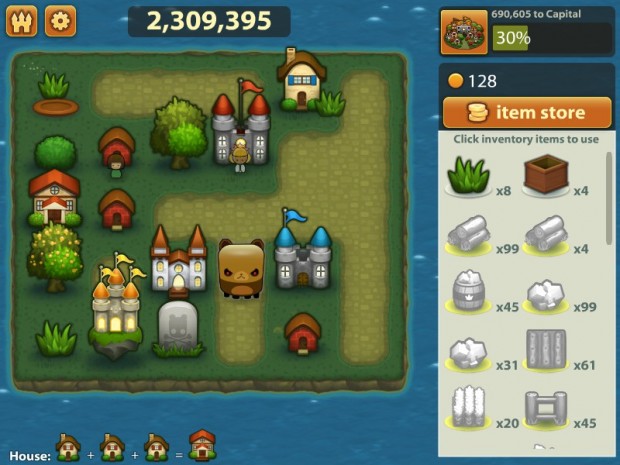I’ve spent a lot of time in 2012 playing games, but not a lot of time writing about them. As I did last year, I’d like to tell some stories or share some thoughts about the ones that meant the most to me this year. I’ll be posting one a day until Christmas. See all Games of 2012 posts.
I generally try to avoid hyperbole, but not tonight: Triple Town is one of the best puzzle games I’ve ever played. I’m putting it on the level of Tetris or Bejeweled or Picross.
One sign of a great puzzle game is being able to explain it simply. I can reduce Triple Town down to three points:
- You’re given a tile, and you place it on the 6×6 play field.
- If three tiles of the same type are touching each other, they combine onto the last placed tile and upgrade to the next type.
- Repeat until the play field is full, at which point the game ends.
Simple and unique. It was so unique, it was effectively stolen from the developers by a trusted partner and cloned, which forced Spry Fox to file a lawsuit.
The path of the tiles follows the natural construction of a town. Grass turns into bushes, bushes into trees, trees into small houses, and then larger and larger houses into castles. The game’s internal geometry clicks quickly, as you’ll quickly devise ways to block off areas to farm lower tier tiles into higher ones.
If that was all there is, Triple Town would be fairly mundane and straightforward. But then come those damned Giant Bears (or as they’re referred to around my house, “Chocobears”) and Ninja Bears. Occasionally appearing in your tile pile, they will get in the way of your attempts to put tiles down. Giant Bears will keep shuffling around until they have no path to follow – at which point they turn into a tombstone. Ninja Bears have to be killed off with a robot.
Like Tetris and Bejeweled, Triple Town balances on the fine line between executing your plan and dealing with curveballs. I have lost track of the number of times I’ve gotten into a flow of my build before an inconvenient tile pops up, forcing me to re-plan. The play field is relatively small, keeping you from having too much breathing room. For a puzzle game with no timer, it can get frustratingly stressful.
It’s been fun to watch Triple Town keep evolving on its own since its launch. When I first played the game, there was just a single map generator, but later updates introduced variations on the theme, like Peaceful Valleys (no bears, but lakes permanently block off some tiles). The recent Mac/PC release added a meta-town; successful upgrades in your meta-town yields items for use in regular towns, and vice versa.
If you’ve ever found yourself deeply addicted to a puzzle game, stay far away from Triple Town. It is crack for puzzle enthusiasts.
Triple Town is available on iOS, Android, Facebook, and Mac/Windows. My experiences were largely with the iOS version, but if you have a choice, get the Mac/Windows one, as it is the “ultimate hardcore version”.
